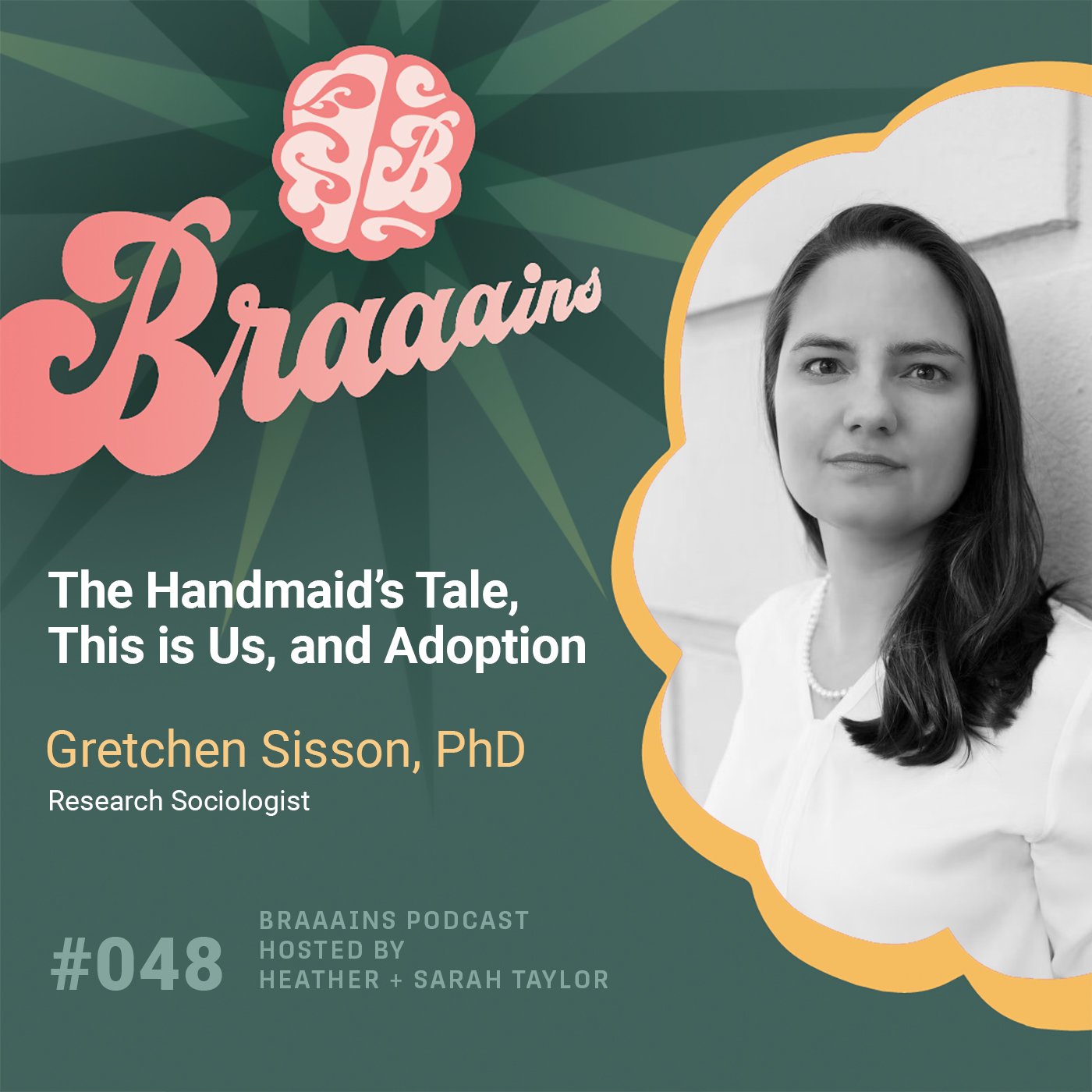Ep 048: The Handmaid’s Tale, This is Us, and Adoption
Today we’re talking with Gretchen Sisson, a research sociologist with Advancing New Standards in Reproductive Health (ANSIRH) in the Department of Obstetrics, Gynecology, and Reproductive Sciences at the University of California, San Francisco. She is the author of Relinquished: The Politics of Adoption and the Privilege of American Motherhood, a critical, ten-year examination of domestic adoption. Centering on the stories of relinquishing mothers, the book chronicles America's refusal to care for families at the most basic level, and instead allows cultural and political ideas of adoption to advance an individual, private solution to large-scale social problems.
Listen on Spotify | Amazon | iHeart | Any player
In our conversation, we discuss the function of adoption in society, its representation in popular culture, and the experiences of birth mothers. We explore the stereotypes and tropes perpetuated by modern adoption stories in TV and film like in shows like This is Us and 16 and Pregnant, and the impact of these narratives on societal biases and policies. We also talk about how the women whom Gretchen spoke with feel like The Handmaid’s Tale is the closest representation of their experience of relinquishing their child. We then delve into the complexities of adoption, the historical context of pre-Roe adoption, and the consequences for birth mothers and relinquished children.
This discussion explores the complexities of adoption, highlighting the experiences and perspectives of birth mothers as captured in Gretchen Sisson's new book. It delves into the emotional journey of birth mothers, their hopes and expectations, as well as the challenges and grief they face. The conversation also touches on the impact of adoption on adoptees, particularly in terms of trauma and identity. It further discusses the connection between adoption and reproductive justice, and the need to critically examine the narratives and beliefs surrounding adoption. Our discussion concludes with a discussion on the potential of pop culture to shape a more nuanced and inclusive narrative around adoption.
Here is a link to find out more about Gretchen's book: https://www.relinquishedbook.com/
Listen to Braaains on these platforms (or anywhere you listen to podcasts!)
Music: Deppisch
Support this show: Patreon.com/BraaainsPodcast
ABOUT OUR GUEST
Gretchen Sisson is a research sociologist with Advancing New Standards in Reproductive Health (ANSIRH) in the Department of Obstetrics, Gynecology, and Reproductive Sciences at the University of California, San Francisco. She is the author of Relinquished: The Politics of Adoption and the Privilege of American Motherhood, a critical, ten-year examination of domestic adoption. Centering on the stories of relinquishing mothers, the book chronicles our country's refusal to care for families at the most basic level, and instead allows cultural and political ideas of adoption to advance an individual, private solution to large-scale social problems. A "comprehensive and harrowing debut" (Publishers Weekly, starred review) that "contributes to our national conversation of what reproductive justice really means" (Gloria Steinem), Relinquished is a necessary examination for our post-Dobbs era.
TAKEAWAYS
Adoption is often viewed as a private solution to social problems, but it fails to address the larger systemic issues that lead to family separation.
The representation of adoption in TV and film often reinforces stereotypes and tropes, such as portraying birth mothers as uninterested or threatening to adoptive families.
The experiences of birth mothers are often silenced and erased, leading to a lack of understanding and empathy in society.
Adoption policies and narratives are shaped by societal biases and the privileging of certain types of families and motherhood.
Modern adoption is complex and entangled with the child welfare system, with poverty being a significant factor in relinquishment.
The cost of adoption is often inflated due to marketing and the demand for infants, and taxpayer dollars could be better used to support families and prevent the need for adoption.
Relinquishing a child for adoption can have long-lasting emotional consequences for birth mothers, and the lack of understanding and support can contribute to trauma.
It is important to challenge the dominant narratives and stereotypes surrounding adoption. Adoption is a complex and multifaceted process that involves both the creation and separation of families.
Birth mothers often experience a range of emotions, from hopefulness and gratitude to grief and questioning their decision.
Adoptees may struggle with trauma and a lack of connection to their birth family, particularly in transracial adoptions.
The conversation around adoption should be integrated into the framework of reproductive justice, considering the conditions and constraints that lead to relinquishment.
Pop culture has the power to shape the narrative around adoption and should strive for more inclusive and nuanced portrayals.
REFERENCES
Instagram: @Gretchen.Sisson; Twitter: @gesisson
Relinquished: The Politics of Adoption and the Privilege of American Motherhood
New goal-setting app: Finch
Bluey’s season three finale got everyone in tears
Other episodes you’ll enjoy:
Abortion Onscreen - Episode 009
Trauma & Horror Films - Episode 017
A Little Advice for the Holidays - Episode 043
Listen to recent episodes on Apple Podcasts:





